
I’ve always thought of music lovers as thoughtful.
I’m not saying I’m a deep thinker, but I have thought about thinking. As I start this blog post I’m thinking about writing about thought.
Stream of consciousness, I think.
Aretha Franklin soulfully finger-wagged at her man:
You better think (think)
Think about what you’re trying to do to me
Think (think, think)
Let your mind go, let yourself be free …freedom
And John Lennon, putting his thinking cap on, sang:
Imagine all the people
Living for today
Imagine. Living for today, because what if there is no tomorrow.
Does that mean death ends the thinking? The thoughts?
In just a few days it will be the anniversary of Lennon’s death. He was shot dead by Mark David Chapman on the doorsteps of John and Yoko’s New York City home on Dec. 8, 1980.
Are his thoughts gone? Certainly, Lennon is thought about by many people. What he once thought is known by millions through interviews, movies, and songs. On Friday’s anniversary, Lennon will be thought about more. But are Lennon’s thoughts gone? Or do they exist? Or is Lennon, perhaps, continuing his thinking in some other realm as a sentient being?
What is thought?
A building block of ideas?
A brain’s computer-like transaction responding to feedback?
A mind’s synthesis of the five senses and memory?
Thought comes from consciousness – but what’s consciousness?
Here’s the cosmic dirty little secret: No one knows.
No one: Scientists, biologists, psychiatrists, philosophers, neurologists, Albert Einstein, not even Russell Brand.
None of them can explain consciousness.
They can describe it. They can look at brain wave patterns and watch brain activity on fancy machines. They can see parts of the answer through the windows of their disciplines. But no one can explain the process by which people and other living things are turned on, animated, for many years before the switch gets turned off. No one knows for sure if the light dies or goes somewhere else, or even where the switch is.
Comedian Steven Wright once joked: “In my house there’s this light switch that doesn’t do anything. Every so often I would flick it on and off just to check. Yesterday, I got a call from a woman in Madagascar. She said, ‘Cut it out.’”
Writing in the magazine Philosophy Now, Philip Goff says we may not even be asking the right question:
It is sometimes said that consciousness is a mystery in the sense that we have no idea what it is. This is clearly not true. What could be better known to us than our own feelings and experiences? The mystery of consciousness is not what consciousness is, but why it is.
Yes, why. That’s always been the killer question, right? Van Morrison on one of his lesser known albums sang: “It ain’t why why why. It just is.”
Which seems to be similar (in tone anyway) to what Descartes said hundreds of years ago. sounding to me like he was being plagued by questions from philosophy students.
Descartes famously wrote: Cogito ergo sum.
I think, therefore I am.
